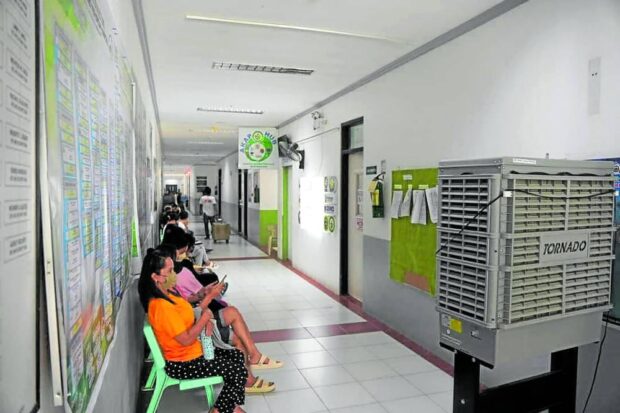Gov’t offices in Occidental Mindoro cut work days to cope with power crisis

EXEMPTED Most government offices in Occidental Mindoro observe the “compressed work week arrangement” due to power crisis, except for agencies offering front-line services like the provincial hospital in the capital Mamburao where these patients are lining up for consultation in this photo
posted on Gov. Eduardo Gadiano’s Facebook page on April 5.
CITY OF CALAPAN, Oriental Mindoro, Philippines — The government offices in Occidental Mindoro adopted a “compressed work week arrangement” to reduce power consumption while the province remains under a state of calamity due to an ongoing power crisis.
Gov. Eduardo Gadiano on Monday issued a memorandum containing the new work arrangement, which also took effect that day, declaring that government offices in the province will only be open from Monday to Thursday from 7 a.m. to 6 p.m. until the 20-hour daily brownouts in the province has been resolved.
However, government hospitals, general service offices, security units, provincial jail, management information system division and other agencies involved in front-line services were not allowed to reduce their working days.
Generators
Gadiano also instructed government employees to limit the use of electric appliances in the offices like air conditioners, water dispensers, lights, and other facilities; and for the offices to turn off water pumps on weekends.
While the province is under a state of calamity (except for the towns of Looc and Lubang), P10 million will be allocated for fuel for generators in public hospitals for the continuation of operations and medical services to those who are sick.
Article continues after this advertisementThe Lubang Island Group, where Looc town is located, is spared from the power crisis since its energy need is provided by the Lubang Electric Power Cooperative Inc. (Lubelco), provincial disaster response officer Mario Mulingbayan told the Inquirer.
Article continues after this advertisementGadiano continued to appeal to the national government to provide a permanent solution to their power problem.
The Occidental Mindoro Electric Cooperative (Omeco) has been implementing a power rotation system, with a given area only receiving about three to four hours of electricity per day, after getting only 12 megawatts from its lone power supplier, the Occidental Mindoro Consolidated Power Corp. (OMCPC), which is less than half of the province’s 30-MW power demand.
The 20-hour power interruptions began on April 13 after OMCPC scaled down its operation because of the nonpayment by the National Power Corp. (Napocor) of the fuel subsidy due to the company. The subsidy is granted to a power supplier in off-grid areas like Occidental Mindoro. The province is not connected to the national power grid, Gadiano earlier told reporters.
The National Electrification Administration (NEA) chief Antonio Almeda has promised to Sen. Raffy Tulfo to resolve the energy crisis in Occidental Mindoro in three weeks, which generated different reactions from local leaders and residents.
“That’s good news, but three weeks appears to be long,” said Vice Gov. Diana Credo Apigo in an emailed reply to the Inquirer on Monday.
Apigo said the NEA could instead tap the available capacity of a private power plant on the island while waiting for the arrival of the generator sets being purchased by the agency from Singapore.
Sablayan Mayor Walter Marquez, in a private message Monday, met the NEA’s promise with skepticism, saying: “That has been their promise for a long time. I hope this time, it happens.”
Roger Calaranan, one of the conveners of Oksi Walang Power Movement, said he also hoped Tulfo could “convey to the President that the only way to permanently solve the problem is to address the underlying causes of these outages, namely the outstanding subsidies owed by (Napocor) and the regulatory gridlock that has not been resolved by the various government agencies responsible for energy.”
‘Step-in rights’
He added that while there were sectors in the province “advocating for an emergency power supply agreement with private suppliers as a quick fix,” it would not solve the issue of massive brownouts in Occidental Mindoro “because rotational brownouts will still be experienced by the people as the power supply will still be insufficient to meet the energy requirements of the province.”
Sen. Sherwin Gatchalian, the vice chair of the Senate energy committee, suggested on Tuesday that the government should exercise its “step-in rights” under Republic Act No. 10531, or the National Electrification Administration Reform Act of 2013, to take control of Omeco, noting that the situation in Occidental Mindoro was not just a simple issue of lack of power supply, but a “management issue” involving the local power distributor.
As an immediate solution, Gatchalian said Omeco and the NEA should ask the Energy Regulatory Commission to allow them to enter into emergency power supply agreements with electricity providers that could bring the needed electricity to the province.
He said the Department of Energy should also start the installation of the needed infrastructure to connect the provinces of Occidental Mindoro and Oriental Mindoro to the main power grid, through the long-proposed underground transmission line from Batangas.